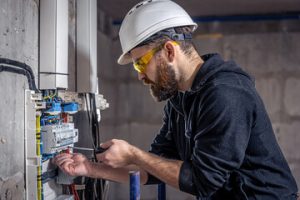Every house and building needs plumbing systems, and when something goes wrong with the pipes, it is a plumber’s job to fix it. Whether it’s a burst pipe or a clogged drain, these skilled tradespeople are crucial to our daily lives.

If you enjoy working with your hands and problem-solving, then a career as Plumber Rosenberg TX may be perfect for you.
A plumber works on a variety of plumbing projects in residential, commercial, and industrial settings. They install and repair pipes, fixtures, and appliances, ensure that water supply and drainage systems work properly, and test backflow prevention devices. In addition, they must be able to read and interpret blueprints and technical drawings. Plumbers also have the responsibility of following all safety and building codes while working on their assignments.
Plumbers may specialize in a certain field of the trade or in a specific area of a house or commercial building. For example, they may be skilled in installing gas or steam boilers, or specialized in water heater installation and repair. They can also install sanitary sewer and waste disposal systems. They can even help in setting up fire protection systems.
A service plumber typically spends a lot of time on maintenance calls and is frequently called to unclog toilets or drains, perform minor repairs, and inspect for code violations. They may also be asked to troubleshoot problems or replace a part in an existing unit. These tasks require attention to detail, good customer service skills, and physical strength and stamina.
Those who choose to be a plumber must have a high school diploma or equivalent, and then undergo formal training through an apprenticeship. They should be able to read and interpret blueprints, and have good troubleshooting skills. Plumbers should also be comfortable with working in tight spaces and using tools. They should be able to solve problems quickly and find creative solutions. Finally, they must be physically fit and able to lift heavy objects.
Those who want to be a journeyman plumber must complete an apprenticeship and receive certification from a state or local agency. They should be able to meet all of the qualifications for a journeyman plumber, including passing an exam. They must also maintain their credentials by attending annual meetings and courses to stay current with developments in the plumbing industry. They must also keep a clean and safe work environment and follow all company policies. Journeyman plumbers often have more responsibilities and are expected to be capable of managing multiple projects simultaneously.
Education and Training Requirements
When it comes to skilled trades jobs, few are as well-paid and fulfilling as plumbing. But before you can become a plumber, you need to have the right skills and training. This career requires excellent problem-solving abilities, technical skills for installing and repairing plumbing systems, and knowledge of building codes and regulations.
You can start your journey to becoming a plumber by taking vocational classes at a local community or trade school. These programs usually last four or five years and combine classroom instruction with on-the-job training. Many of these programs offer accelerated tracks for those who want to get their education faster.
Once you have completed your apprenticeship, you can become a journeyman plumber by passing a licensing exam. In addition, some states require plumbers to be certified in order to perform certain types of work, such as working on gas pipelines. Getting your certification can be a long process, but it will ensure you have the skills and knowledge needed to succeed as a plumber.
Another way to gain the skills and experience you need is by joining a union. This will provide you with a wide range of training opportunities, as well as support and benefits like health insurance and vacation days. The most important consideration when deciding whether to join a union is whether you are comfortable with the level of commitment required.
Plumbers are responsible for a wide variety of tasks, including installing, repairing, and maintaining plumbing systems. They must be comfortable working with hand and power tools, reading blueprints and rough drawings, and interpreting various types of measurement systems. They also need to be proficient in a number of math concepts, such as algebra, geometry, and conversion of measurements.
In addition, most states require plumbers to be licensed in order to perform certain types of work. The most common path to a plumber’s license is through an apprenticeship program, which typically lasts 4-5 years and combines classroom instruction with on-the-job training. Other ways to obtain a plumber’s license include earning a bachelor’s degree in a relevant field, passing an exam, and completing continuing education courses.
Work Environment
A plumber’s work environment isn’t limited to an office or specific job site. They often travel between jobs, working in homes, businesses, and construction sites. This variety keeps their work interesting and challenging, and it helps them develop a wide range of skills. Whether they are fixing leaky pipes or installing new fixtures, they use their problem-solving skills to meet the needs of each customer.
Plumbing contractors install and maintain plumbing systems in residential and commercial buildings. They follow blueprints and building codes to ensure plumbing is installed properly. They may also be responsible for laying out and connecting piping systems to water supply lines, fire sprinklers, and drainage systems. These professionals often collaborate with other tradespeople, such as carpenters and electricians, to complete large projects.
In residential settings, plumbers work directly in people’s homes and apartments. They usually work on repairs or installations that involve toilets, sinks, bathtubs, showers, and other household appliances. This can be a physically demanding job, as plumbers often need to work in tight spaces and navigate around furniture or other fixtures. Additionally, they often need to wear protective gear when handling hazardous materials or working in confined areas. Plumbers who specialize in home repairs or maintenance may interact with customers regularly to discuss their concerns and provide estimates for their services.
Work environments for plumbers in the commercial and industrial sector are similar to those in the residential sector. They may be involved in the installation or repair of larger-scale plumbing systems for office buildings, retail stores, restaurants, hospitals, and factories. They also work closely with other construction tradespeople to ensure plumbing is integrated seamlessly into the overall building design and infrastructure.
Plumbers who are experienced can find steady work with reputable companies or even start their own plumbing business. This career is a great option for those who are interested in a hands-on, challenging job that pays well. Those who are not comfortable with physical demands or don’t have the patience to solve complex problems should consider other options. Those who choose to become plumbers should also make sure they have good manual dexterity, as the profession requires frequent use of tools and hands.
Salary
Plumbing is an in-demand job with plenty of opportunities to expand your earning potential. As you gain experience, specialized work and certifications become available to help you advance in the field. You can also choose to open your own plumbing business and control how much you earn. This type of career is perfect for people who love to work with their hands and enjoy solving real-world problems.
Residential plumbers work directly in customers’ homes and apartments. This can require working in tight spaces like crawl spaces and basements. In addition, you may need to interact with homeowners or tenants to discuss their plumbing issues and repair options. Commercial plumbers handle larger plumbing projects and installations. This type of work often involves laying out large piping systems and connecting them to appliances and water supply lines. Commercial plumbers typically work on building construction sites alongside other tradespeople, including carpenters and electricians.
The demand for plumbers varies depending on the economy and industry trends. During periods of economic growth, new construction and infrastructure projects often lead to an increase in plumbing jobs. This can lead to higher plumber salaries. However, if the economy slows down, demand for plumbers tends to decline. This can lead to fewer job opportunities and lower plumber salaries.
You can increase your earning potential by becoming a master plumber or taking on specialized work. Specialized skills, such as soldering, 3D CAD modeling and pipe layout, can set you apart from other plumbers. Additionally, you can take on specialty projects, such as installing medical gas systems or high-tech water filtration systems.
Depending on where you live, your plumber salary may vary. Some states have minimum wage laws, while others don’t. In addition, many plumbers receive holiday or overtime pay. It’s important to research local wages before accepting a job in order to ensure you’re getting a fair salary.
As a plumber, you can earn a lucrative income by following industry trends and providing your services to the right clients. The best way to grow your career as a plumber is to focus on the types of plumbing projects you’re interested in and make sure you have the proper credentials and licenses to work in those fields. You can also find success by opening your own plumbing business and establishing a reputation for quality work.


